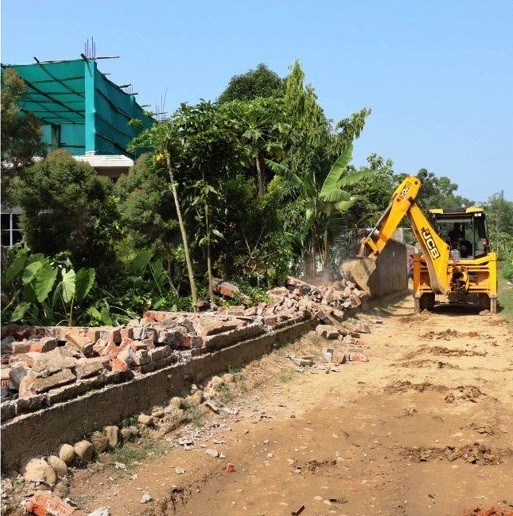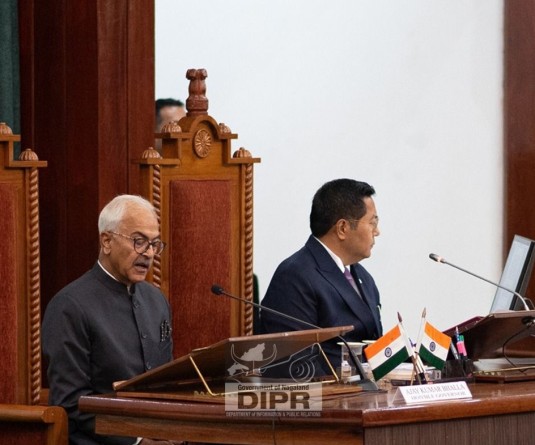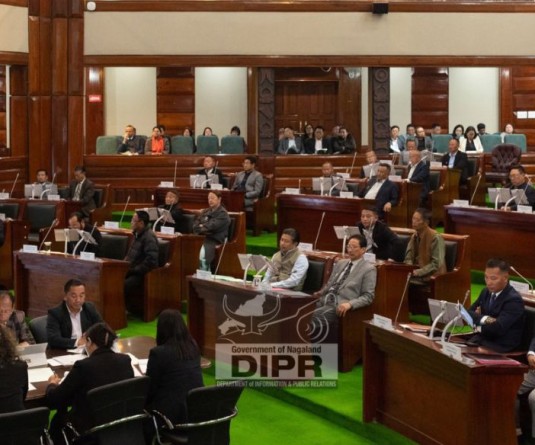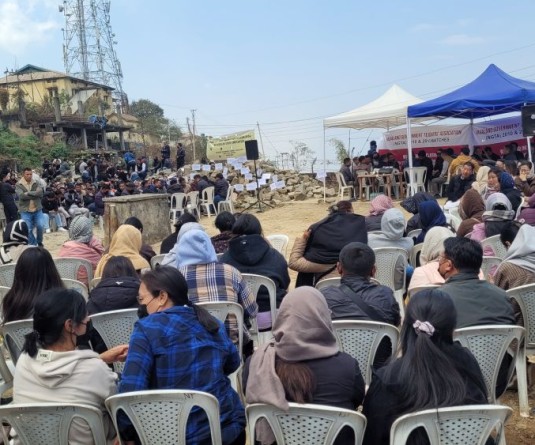Eviction drive being carried out on illegally occupied government land on June 13. (DIPR File Photo)

Morung Express News
Dimapur | June 29
The Supreme Court has dismissed a Special Leave Petition (Civil) challenging the May 27 order passed by the Gauhati High Court (GHC) Principal Bench concerning eviction proceedings on land designated for the expansion of Dimapur Airport.
The High Court’s judgment had quashed earlier interim injunctions issued by lower courts that had stayed the eviction process.
Following the judgment, an eviction drive was carried out on the ‘encroached land’ at Dimapur Airport on June 13.
“Having heard learned counsel for the petitioner, we are not inclined to interfere with the impugned order. Special Leave Petition is accordingly dismissed,” stated the SC order issued by Justice KV Viswanathan and Justice Nongmeikapam Kotiswar Singh after hearing the case on June 23.
However, it clarified that further proceedings in the suit may continue independently, without being “influenced by any observations that High Court has made in the impugned order.”
With the dismissal of the SLP by the Supreme Court and the eviction already undertaken, the case has largely attained finality.
Gauhati High Court’s ruling
The Civil Revision Petitions (CRP 104 & 105), filed by the State of Nagaland and its agencies, challenged earlier orders passed by the Civil Judge (Senior Division), Dimapur on November 22, 2021, and upheld by the Principal District Judge on September 29, 2023.
These orders had restrained the State from carrying out eviction derive from land earmarked for the airport expansion.
In its ruling, Justice Robin Phukan held that the injunctions were “legally untenable.” The lower courts, he stated, had failed to meet the legal standards for granting equitable relief and had overlooked key facts and statutory provisions, thereby obstructing a vital public infrastructure project.
The dispute involved approximately 33 bighas of land in Diphupar village under Dimapur Mouza No. 3. One of the respondents had claimed ownership based on a patta issued in 2007, allegedly derived from earlier temporary allotments in the 1990s and later regularisations.
The State maintained that the land had been acquired for airport expansion through a Gazette Notification dated September 23, 1992, and vested with the government under Section 6(2) of the Nagaland Land (Requisition and Acquisition) Act, 1965. The respondent’s allotment was cancelled on May 31, 2005, and the cancellation order was never contested. Furthermore, a Commissioner’s order dated November 30, 2019, had declared 15 respondents as encroachers, a finding that stood uncontested.
Three crucial legal tests for injunction
The High Court examined whether the lower courts had correctly applied the three legal principles required for granting injunctions: prima facie case, balance of convenience, and irreparable injury, as laid down by the Supreme Court.
On prima facie case, the Court held that physical possession alone does not establish legal entitlement—especially when the land documents were allegedly based on forged signatures or allotments without government sanction. The respondent failed to demonstrate a legitimate legal claim.
On balance of convenience, the Court ruled that prolonging the injunction would benefit those with questionable claims while delaying a public project vital to the State. It found that lifting the injunction would result in less harm to the respondent compared to the continued disruption of airport development.
On irreparable injury, the Court noted that any loss to the respondent could be compensated monetarily, while delaying the airport project had wider public consequences.
Fourth dimension
Justice Phukan underscored public interest as a critical “fourth dimension” in matters involving State infrastructure. Citing Supreme Court judgments, the Court reaffirmed that public interest must override individual claims in critical infrastructure projects.
The judgment also invoked Section 41(ha) of the Specific Relief Act, which bars courts from issuing injunctions that delay or obstruct infrastructure development, including airports listed under its Schedule.
Ignoring statutory findings
The High Court further criticised the Trial and Appellate Courts for ignoring key findings from competent authorities, particularly the unchallenged cancellation of allotments order in 2005 cancellation and the 2019 declaration of encroachment under the Nagaland Eviction of Persons in Unauthorised Occupation of Public Land Act, 1971.
Justice Phukan observed, “The findings arrived at by the competent authority in a different forum, if otherwise relevant and legally tenable, cannot be ignored merely on the ground that they were rendered elsewhere.”
Ignoring these determinations, which were uncontested and attained finality, had a direct bearing on the case and amounted to a miscarriage of justice, he noted.
The High Court allowed the revision petitions, set aside the orders passed by the lower courts, and directed that the records be returned.
Official enquiry
Meanwhile, the Nagaland Police informed on June 13 that total of 31 individuals, including six government officials, have been named in a criminal case related to the illegal encroachment of land at Dimapur Airport.
Chargesheets have been filed against 25 private individuals, while sanction for prosecution has been sought for six public servants following a Special Investigation Team (SIT) probe, according to a press release from the Nagaland Police.
So far, the police have not provided an update on whether the sanction for prosecution has been obtained .
On the day of eviction carried out by Chümoukedima and Dimapur administrations, official informed that the evicted land covered some 17.9 acres in area. The eviction drive specifically targeted land at Dak number 38 and 40 in Diphupar village.






